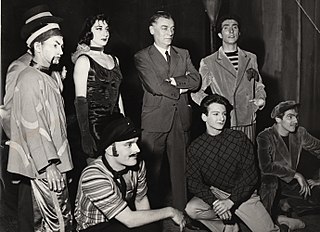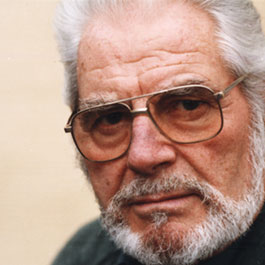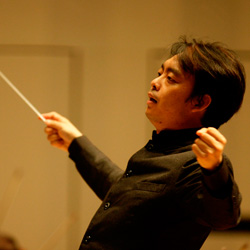
The Teatro dell'Opera di Roma is an opera house in Rome, Italy. Originally opened in November 1880 as the 2,212 seat Costanzi Theatre, it has undergone several changes of name as well modifications and improvements. The present house seats 1,560.

Gianluigi Gelmetti OMRI, was an Italian-Monégasque conductor and composer.

The Teatro Argentina is an opera house and theatre located in Largo di Torre Argentina, a square in Rome, Italy. One of the oldest theatres in Rome, it was constructed in 1731 and inaugurated on 31 January 1732 with Berenice by Domenico Sarro. It is built over part of the curia section of the Theatre of Pompey. This curia was the location of the assassination of Julius Caesar.

The Maggio Musicale Fiorentino is an annual Italian arts festival in Florence, including a notable opera festival, under the auspices of the Opera di Firenze. The festival occurs between late April into June annually, typically with four operas.

Roberto Abbado is an Italian opera and symphonic music conductor. Currently he is an Artistic Partner of The Saint Paul Chamber Orchestra. In 2015 he has been appointed music director of Palau de les Arts Reina Sofia in Valencia, Spain. From 2018 he's Music Director of the Festival Verdi in Parma. Previously he held the position of Chief Conductor of Münchner Rundfunkorchester.
Andrea Molino is an Italian composer and conductor.

Pier Miranda Ferraro was an Italian operatic tenor who had an active international opera career from 1951 through 1981. He particularly excelled in the dramatic Italian repertoire with his signature role being the title role in Giuseppe Verdi's opera Otello. Other important roles in his performance repertoire included Radames in Verdi's Aida, Alvaro in La Forza del Destino, and des Grieux in Giacomo Puccini's Manon Lescaut. He also found success in the German repertoire portraying Wagnerian heroes. Although he was a gifted singer and had a highly impressive list of performance credits, he never achieved the international recognition enjoyed by his most important contemporaries, such as Franco Corelli or Mario Del Monaco. After retiring from the opera stage in 1981 he took up a second highly successful career as a voice teacher.
Marco Boni is an Italian conductor.

Aldo Brizzi is an Italian composer and conductor.

The Graz Opera is an Austrian opera house and opera company based in Graz. The orchestra of the opera house also performs concerts as the Graz Philharmonic Orchestra.

Hirofumi Yoshida is a Japanese orchestral conductor. He resides in Italy, but grew up in Funabashi, Chiba, Japan.

Zoltán Peskó was a Hungarian conductor and composer who held leading positions at German, Italian and Portuguese opera houses and orchestras, including the Deutsche Oper Berlin, Teatro Comunale di Bologna, La Fenice, and Teatro Nacional de São Carlos. He was a regular conductor at La Scala, where he promoted contemporary opera.
Ștefan Pop is a Romanian operatic tenor. He is considered among today's leading lyric tenors and he is best known for bel canto repertoire. He has won several prizes including, in 2010, Plácido Domingo's Operalia competition and the Seoul International Music Competition.
Edoardo Müller was an Italian conductor who was chiefly recognized for his interpretations of bel canto operas. A frequent guest conductor with opera houses internationally, he had a lengthy association with the San Diego Opera which spanned 31 years. He was also an accomplished pianist who accompanied several notable singers in recitals and concerts; including Carlo Bergonzi, Renato Bruson, Montserrat Caballé, José Carreras, Leyla Gencer, Elena Obraztsova, and Renata Tebaldi. His work is preserved on recordings made for the Philips, BMG, Bongiovanni, and Orfeo record labels. He served as conductor for Joyce DiDonato's 2009 CD Colbran, the Muse: Rossini Opera Arias.
Michele Mariotti, born in 1979 in Urbino, near Pesaro, is an Italian conductor, the direttore musicale since 2014 of Teatro Comunale di Bologna. A graduate in composition of Pesaro's Conservatorio Rossini, where he also studied orchestral conducting, he made his professional opera debut with Il barbiere di Siviglia in Salerno on Oct. 12, 2005. As of April 2017, his repertory included nine Rossini and eight Verdi operas, an extraordinary achievement, as well as symphonies of Beethoven, Bruckner and Schubert, the Rossini Stabat mater, the Mozart Requiem and the Verdi Requiem.

Oksana Yaroslavivna Lyniv is a Ukrainian conductor, since 2022 music director of the Teatro Comunale di Bologna. She founded the Youth Symphony Orchestra of Ukraine in 2016. She conducted on 25 July 2021 the opening of the Bayreuth Festival, a new production of Der fliegende Holländer, as the first female conductor at the festival.
Alessandro Solbiati is an Italian composer of classical music, who has composed instrumental music for chamber ensembles and orchestra, art songs and operas. He received international commissions and awards, and many of his works are recorded. He is also an academic, teaching in Italy and France.
Gianluca Martinenghi is an Italian opera and symphonic music conductor. From 2016 to 2018 he was the Music director of Macedonian National Theatre. Currently he is the Artistic Secretary of Teatro Reggio in Turin, Italy,

Jolanda Meneguzzer was an Italian lyric soprano who made regular appearances at leading opera houses in the 1960s.

The Youth Symphony Orchestra of Ukraine is a Ukrainian national youth orchestra founded by conductor Oksana Lyniv in 2016. She has conducted the orchestra in major concerts halls and festivals in Europe.
















